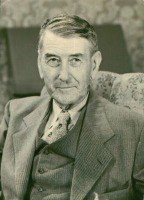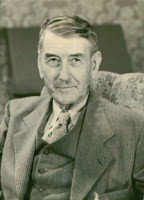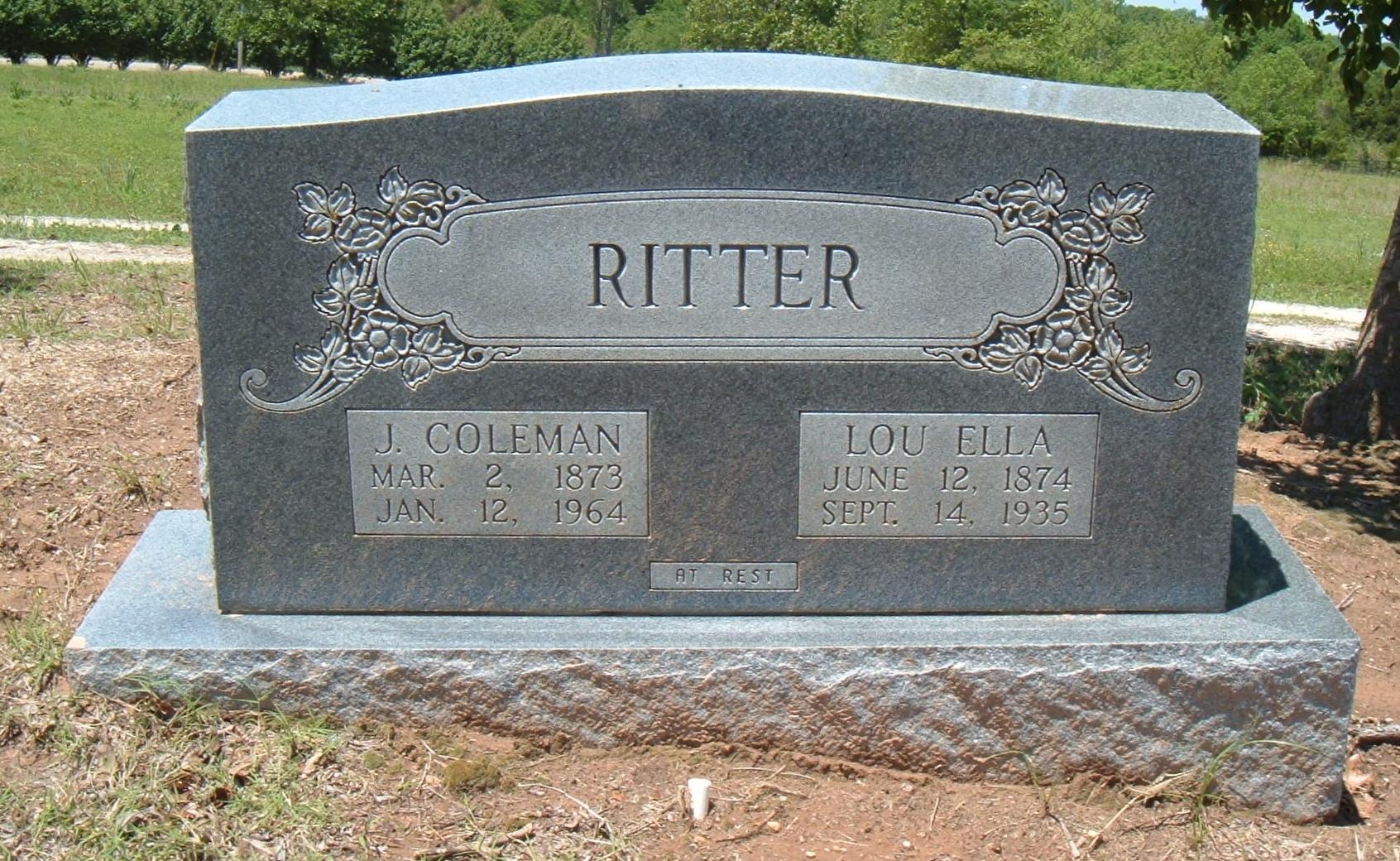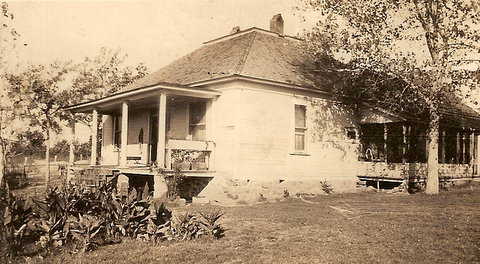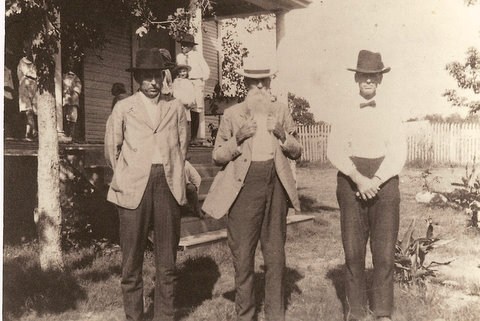Interview with J.C. Ritter
Investigator: Nettie Cain
January 25, 1938
Atwood, Oklahoma
I was born in 1879, in Lee County, Mississippi, and was fifteen years old at the time I left that state with my parents. We lived twenty-five miles from a railroad.
We came to Fort Smith, Arkansas, and settled three miles east of Sugar Loaf Mountain in 1888, near Cameron.
This was in the Choctaw country and Green McCurtin was one of the Choctaw Indian leaders. At this time a white person would have to get a permit to lease Indian land, which would cost him about $15.00 a year for forty acres of land.
A short time after we arrived in the Indian Territory, my father, Everett Bayless Ritter put in a store. We would go to Fort Worth after our stock of supplies, going across the Backbone Mountain. We had to pass a toll gate and had to pay 50 cents for a wagon and team for a round trip. The funds thus derived were used to keep the road worked and in shape to travel. Father would sometimes have a wagon bed full of eggs which he would pack in loose hay and haul them across the mountains and very few of them were ever broken.
The Indians were very honest in all their business dealings. At this time there were no churches or schools, but soon a few of the white people decided to have a school for their children so employed a teacher to teach a subscription school; so much was charged few each student. Then they soon began to have church and Sunday School. The Indians had very few churches but they had a lot of dances and big ball games.
In 1901 I bought my father's store and later moved to Calvin. In 1905 I moved my family to Calvin and in 1907 we moved to Atwood.
I am still interested in the public welfare of Hughes County and still operate a store In Atwood.
Second Interview with J.C. Ritter
MR. RITTER'S STROY:
My parents came to Oklahoma "about the first of November 1887." They came by rail from Amory, Mississippi, to Fort Smith, Arkansas, thence by wagon to Cameron, or rather to Kully Chaha, as that was before Cameron.
I moved from what is now Le Flore County and came to Hughes County in 1904.
Some of our most interesting episodes were when some settler refused to pay his permit and was ejected from the Territory.
The family of Uncle Joe Tucker was very interesting at the time we came to the Territory. Uncle Joe is dead now and the boys are scattered. His daughter, Mrs. J. H. Adams, lives at Atwood. Mrs. Katie Hill (widow of Bud Hill) lives at Cameron and is also a daughter of Uncle Joe Tucker. Bud Hill was killed while serving as a deputy U.S. Marshall before statehood. Hill was a mighty fine man and I thought it would have been impossible to have killed a man that our community would have missed as much as he was, he was killed by a Mr. Simpson, whose boy he and Boley Grady were trying to arrest, near Jenson Arkansas. They were at a meeting just across the line from Jenson and the boy had been disturbing the meeting, so Hill and Boley Grady were asked to be there and arrest him, and Grady had gone under the arbor and had the boy down and he called for his father, who came to his rescue and killed Hill and Grady both. (Or rather killed Grady and Hill both, as he killed Mr. Grady first.)
Interview with J.C. Ritter
Investigator: Nettie Cain
January 25, 1938
Atwood, Oklahoma
I was born in 1879, in Lee County, Mississippi, and was fifteen years old at the time I left that state with my parents. We lived twenty-five miles from a railroad.
We came to Fort Smith, Arkansas, and settled three miles east of Sugar Loaf Mountain in 1888, near Cameron.
This was in the Choctaw country and Green McCurtin was one of the Choctaw Indian leaders. At this time a white person would have to get a permit to lease Indian land, which would cost him about $15.00 a year for forty acres of land.
A short time after we arrived in the Indian Territory, my father, Everett Bayless Ritter put in a store. We would go to Fort Worth after our stock of supplies, going across the Backbone Mountain. We had to pass a toll gate and had to pay 50 cents for a wagon and team for a round trip. The funds thus derived were used to keep the road worked and in shape to travel. Father would sometimes have a wagon bed full of eggs which he would pack in loose hay and haul them across the mountains and very few of them were ever broken.
The Indians were very honest in all their business dealings. At this time there were no churches or schools, but soon a few of the white people decided to have a school for their children so employed a teacher to teach a subscription school; so much was charged few each student. Then they soon began to have church and Sunday School. The Indians had very few churches but they had a lot of dances and big ball games.
In 1901 I bought my father's store and later moved to Calvin. In 1905 I moved my family to Calvin and in 1907 we moved to Atwood.
I am still interested in the public welfare of Hughes County and still operate a store In Atwood.
Second Interview with J.C. Ritter
MR. RITTER'S STROY:
My parents came to Oklahoma "about the first of November 1887." They came by rail from Amory, Mississippi, to Fort Smith, Arkansas, thence by wagon to Cameron, or rather to Kully Chaha, as that was before Cameron.
I moved from what is now Le Flore County and came to Hughes County in 1904.
Some of our most interesting episodes were when some settler refused to pay his permit and was ejected from the Territory.
The family of Uncle Joe Tucker was very interesting at the time we came to the Territory. Uncle Joe is dead now and the boys are scattered. His daughter, Mrs. J. H. Adams, lives at Atwood. Mrs. Katie Hill (widow of Bud Hill) lives at Cameron and is also a daughter of Uncle Joe Tucker. Bud Hill was killed while serving as a deputy U.S. Marshall before statehood. Hill was a mighty fine man and I thought it would have been impossible to have killed a man that our community would have missed as much as he was, he was killed by a Mr. Simpson, whose boy he and Boley Grady were trying to arrest, near Jenson Arkansas. They were at a meeting just across the line from Jenson and the boy had been disturbing the meeting, so Hill and Boley Grady were asked to be there and arrest him, and Grady had gone under the arbor and had the boy down and he called for his father, who came to his rescue and killed Hill and Grady both. (Or rather killed Grady and Hill both, as he killed Mr. Grady first.)
Family Members
-
![]()
Eunice Clotilda Ritter Irwin
1893–1967
-
![]()
Ruby Lillian Ritter Irwin
1894–1974
-
Ora Bernice Ritter
1897–1898
-
![]()
Averett Coleman Ritter
1899–1973
-
![]()
Olus Geneva Ritter Bankston
1901–1988
-
![]()
Clarice Inez "Bo" Ritter Nash
1904–1996
-
![]()
Clyde Joseph Ritter Sr
1906–1986
-
![]()
Maurice Elbert "Boss" Ritter
1908–1986
-
![]()
Ella Maude Ritter Sparks
1908–2001
-
![]()
Virgil Neil "Red" Ritter
1910–1940
-
Dallas Merle Ritter
1912–1999
-
![]()
CPL Bernard Leroy Ritter
1914–2006
-
![]()
1SGT Wendell Alexander "Tex" Ritter
1916–1997
Sponsored by Ancestry
Advertisement
Explore more
Sponsored by Ancestry
Advertisement
